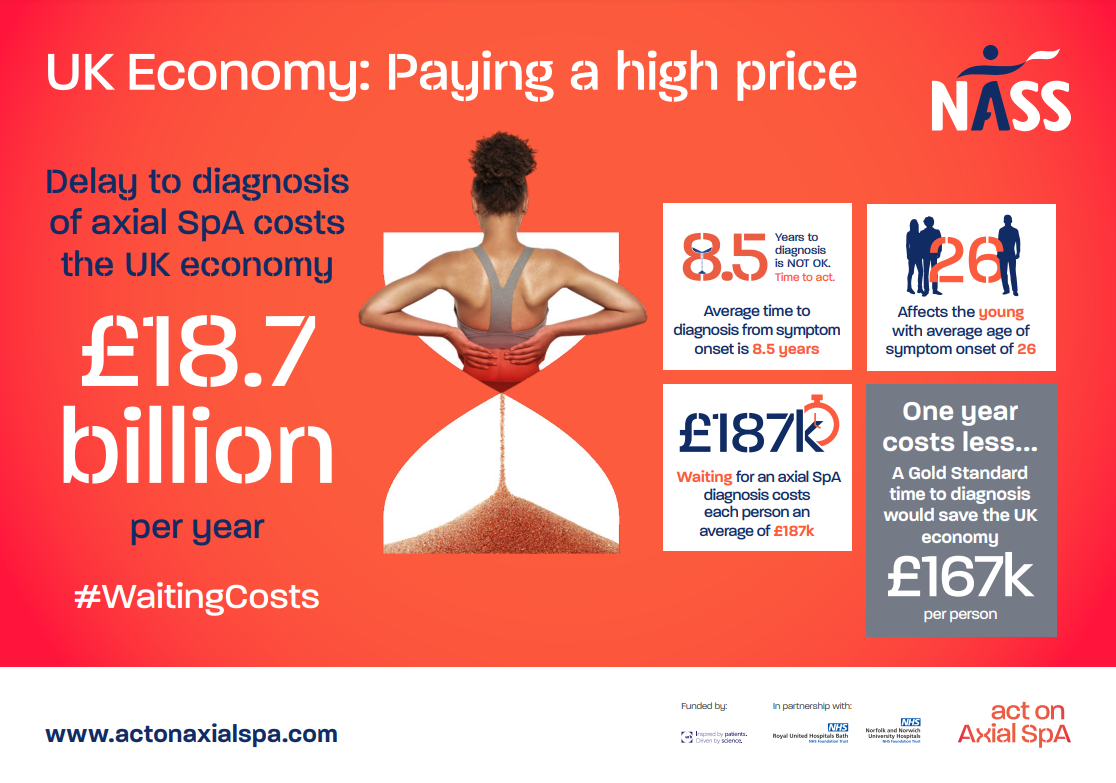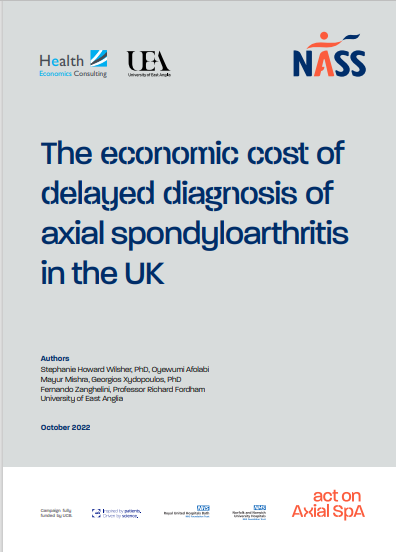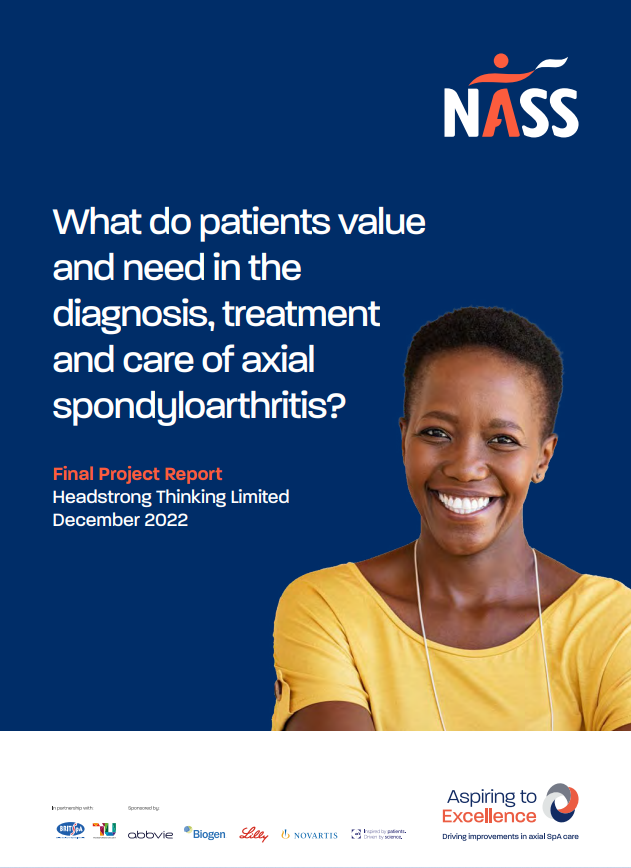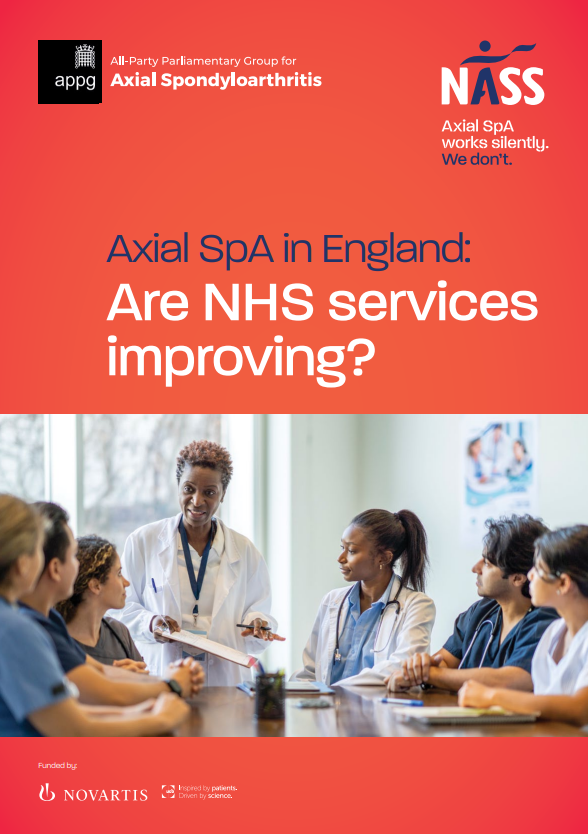NASS Gold Standard research
NASS Gold Standard research
As part of our policy and campaigning work we have commissioned research to help build the burning platform and influencing policy makers and health care professionals as we target a social movement. A social movement which will ultimately catalyse driving down diagnostic delay.

Economic cost of delayed diagnosis in axial SpA
Economic cost of delayed diagnosis in axial SpA
New research shows that the UK is paying an unnecessarily high price for the delays in diagnosing axial spondyloarthritis (axial SpA).
Axial SpA is a painful form of inflammatory arthritis that affects 1 in 200 UK adults. It starts young, with people often experiencing symptoms from their mid-teens to early 20s.
Currently, people wait an average of 8.5 years for a diagnosis and the research shows that:
- This delay costs the economy an estimated £18.7 billion per year
- A patient aged 26 who waits 8.5 years for a diagnosis is likely to lose around £187,000
- By driving down the average diagnosis time to one year, the UK economy could save £167,000 per person.
The study has been commissioned by the National Axial Spondyloarthritis Society (NASS) and released for World Arthritis Day.

Cost of Delayed Diagnosis Modelling and Planning Tool
Cost of Delayed Diagnosis Modelling and Planning Tool
Commissioned by NASS, Health Economics Consulting (HEC) undertook the research to create a new health economics model to assess the cost of delayed diagnosis, up to the point of diagnosis of axial SpA by combining healthcare, out of pocket costs and productivity costs/losses.
HEC considered the best way to model the potential cost and established that a Markov Chain model process was the most effective in representing the NASS Act on Axial SpA campaign aiming to drive down the time to diagnosis.
Read here an overview of the model and how you can request access or ask more.

What do patients value and need in the diagnosis, treatment and care of axial spondyloarthritis?
What do patients value and need in the diagnosis, treatment and care of axial spondyloarthritis?
NASS has released the findings of its latest research initiative in a report titled ‘What do patients value and need in the diagnosis, treatment and care of axial spondyloarthritis?’
The research, which was commissioned by NASS and carried out by Headstrong Thinking Limited, set out to understand the needs and values of people living with axial SpA in diagnosing and managing the condition and to assess the extent to which these are reflected in people’s experiences of services.
The results are striking:
- Respondents reported feeling disbelieved by health care professionals when seeking a diagnosis
- Some didn’t feel listened to or valued
- Sometimes clinicians seemed to lack empathy and understanding of their pain and anxiety
- A significant proportion had to pay privately to get their diagnosis
- Respondents felt like there was a lack of joined up thinking about different specialisms
- Once diagnosed, patients felt there was a lack of support and information available
- Many reported not feeling involved in decisions about their care
- Women, young people and those on a lower income were more likely to have a negative experience of care.

Axial SpA in England: Are NHS services improving?
Axial SpA in England: Are NHS services improving?
Patients with axial spondyloarthritis (axial SpA) are still receiving a poor standard of care and being systematically let down by the health care system, despite an investigation that called for urgent improvements in 2020, according to a new MP led national inquiry.
The findings from the inquiry, led by the All-Party Parliamentary Group on Axial Spondyloarthritis (APPG), are based on responses from 85 NHS Trusts and 36 Integrated Care Boards to a Freedom of Information (FOI) request.
The inquiry found that less than half of NHS Trusts have an ‘inflammatory back pain pathway’. As a result, GPs and other primary care professionals are not routinely referring patients direct to rheumatology for assessment and diagnosis. Low levels of awareness of axial SpA among GPs and other primary care professionals contribute to an average time to diagnosis in the UK of 8.5 years, and yet only 45% of NHS Trusts offer relevant training for GPs.
Rapid identification and treatment of axial SpA is essential. However, only 14% of patients receive a diagnosis within the recommended eight weeks from GP referral. Specialist assessment is essential, yet only 47% of patients have access to a specialist axial SpA clinic.
Many people living with axial SpA feel locked out of life. It’s common for people to experience psychological distress and 40% of patients report some depressive symptoms. People often report feelings of hopelessness, anxiety and isolation. However, only 1 in 5 rheumatology teams are able to refer directly to psychological support.
